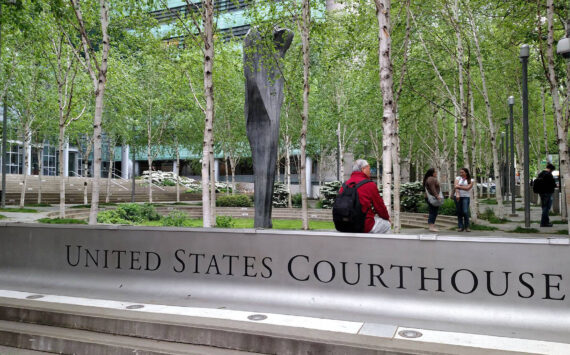Brave and Enlightening
DEAR NINA SHAPIRO: Your article [“The Color of Money,” April 25] was sent to me (and all the rest of the Lakeside alums at my college) by a friend. I just want to say that I’m so thankful you wrote it. After all the negative press Lakeside’s gotten, we really needed to hear something more evenhanded. I think you did a fantastic job of showing the school as it really is, not the way one camp or another wants to present it. It was a brave and enlightening article.
Jane Jiang
Cambridge, MA
Marginalized and Studied
DEAR NINA SHAPIRO: Thank you for your article. I worked at Lakeside School from 2004 to 2005. I was recruited and moved with my family to Seattle from Oakland, and was given pretty much the same story you have reflected—about how Lakeside was attempting to become a diverse and accepting school. Clearly, this had some meaning, but there was never enough significant guidance to accomplish the goal. The only black voices that were heard came from consultants paid to “market” the idea to a reluctant faculty; parents whose children made up the few students of color on campus; or former students, like TJ [Vassar], who have been recycled for years because they are the few that can actually admit to positive experiences as a Lakeside student of color.
Academics, who claim to know so much, really know very little about how to relate to people on multiple levels (professionally, socially, etc.), especially people of color. When a member of the faculty or staff of color spoke out about indifference or racism, immediately everyone within the majority felt they were being attacked. For some, it has never gone beyond “learning the handshake,” and that was demonstrated on a daily basis at Lakeside School.
There was never really any mention of students and how they would benefit from this “mandate,” no proactive development of programming that went beyond “letting the Eritrean girl talk about what it’s like to go to school here” (yes, that actually happened)—essentially, no buy-in. It became increasingly clear that students, faculty, and staff of color would be marginalized and studied, rather than considered an inclusive part of the community.
I left Lakeside much like others did, in the “dark of night” with no cake or ice cream. A quiet meeting and away I went, never to engage with my colleagues or friends again (for this was and still is the Lakeside way of dealing with its issues). If anything, I just hope that Lakeside admits to where it stands and discontinues its efforts to recruit students of color, and faculty or staff of color, until they can address and clean their own house of racism.
Darrell Nabers
Admissions/Financial Aid Analyst,
University of Chicago
Thanks for the Reminder
DEAR NINA SHAPIRO: Thank you for your article. Like many other African American families, we became disappointed and disillusioned with Seattle Public Schools and moved our two children from the system in their middle-school years. We found an independent school that served our son quite well during his high-school years (he is currently a freshman at the UW), and our daughter is currently experiencing success at the same school.
Lakeside’s problems with students/families of color, particularly African Americans, are legendary. Every time I hear something about the school that makes me prone to give it a second chance, I get slapped in the face by events like those chronicled in your article that make me think the proverbial “the more things change….” Fortunately, we saw the light when our son was in middle school—we would never subject our son, or anyone we consider a friend, to the abuse meted out by Lakeside in the name of “academic rigor.” Thanks for reinforcing our decision NOT to send our children there.
Howard and Rhonda Berry
Seattle
Lawsuits are Misleading
DEAR EDITOR: Right off I want to admit to a certain bias in at least one respect: Lakeside was a good school for me and so far has been an excellent one for my daughter. But no place is best (or necessarily even good) for everybody. Beyond that, I appreciate the difficulty of getting much below the surface—even in a relatively lengthy news story—when discussing the interplay of complex issues of race, class, privilege, and education within a school. And I also appreciate that most of us, to some degree or another, derive at least secret pleasure from seeing warts exposed on “elite” institutions; no one is going to read something that doesn’t have an angle.
However, I do quibble with the increasingly common journalistic practice of taking stock of an institution through the lens of a lawsuit. Without question such suits often reveal broad patterns of institutional misfeasance or malfeasance that harm, and threaten continuing harm to, many people. But fairly frequently a lawsuit is no more than an expression of a highly particular grievance of an individual. Our justice system is based on competing parties “zealously” advocating their respective positions, which often means making extreme claims (and counterclaims). As a result, journalists relying on court filings for the framework of a story risk making tendentious extrapolations from the facts of a specific case that, when applied more generally, unduly weight the position of one of the parties at the unfair expense of the other.
The bottom line for me is that as a community and a society, we need to figure out how to have more productive discussions about race. Certainly it is vital to address continuing public and private institutional shortfalls in eradicating the vestiges of discrimination of all kinds. And at the head of the list is addressing racism against African Americans because of our nation’s disgraceful experience with that. But frequently glossed over is the need for each of us as individuals to face up to our own personal prejudice and bias. Maybe if all of us stop making as many assumptions about what is motivating others and stop taking as many things directed at us personally, we’d be a step further along the road to a healthier society.
Lee Brillhart
Seattle
The Facts on Physics
DEAR EDITOR: I would like to respond to this passage:
Bob Simeone, a parent who co-chaired the school’s diversity committee for a couple of years recently, recalls frustration as Lakeside officials would travel around the country to attend meetings of African American physics teachers and so on—only to come back empty-handed. “They couldn’t find one?” he remembers thinking. He and others who watched the process say they came to realize that black teachers had more appealing options, like working at a college or with larger numbers of minorities at a public school.
As the faculty member involved in the example Simeone cites, I can say that the only thing he got right was that we were hiring a physics teacher.
In our efforts to deepen the diversity of our candidate pool, we decided to explore nontraditional areas of recruitment, and so TJ Vassar and I attended the National Society of Black Physicists conference in Washington, D.C. The conference had, in its attendance, hundreds of professional physicists and graduate students, and we were the only high school, private or otherwise, that was there to recruit teachers. Our booth was wedged neatly between booths from NASA and the CIA, and physicists visiting our booths were choosing between careers with six-figure starting salaries and a high school. No physicist I spoke with was opting to teach at a public school over Lakeside.
Finally, Simeone was wrong about our success; we found a graduate student finishing his thesis who was choosing between a career in industry and teaching. This candidate interviewed at Lakeside, but was not the fit we were looking for. But we would most certainly never have found this candidate were it not for the support the school provided for our efforts to recruit more broadly than we had historically.
I would have thought Ms. Shapiro would have fact-checked a little more carefully, but I am hoping to set the record straight on this score, at least.
Thomas Artiss, Ph.D.
Biology Teacher,
Lakeside School
Celebrate “Privilege”
DEAR EDITOR: Education is not supposed to be “all smooth,” even “inclusive,” certainly not always “enjoyable” or “happy.” It should be rigorous and at times rough, exclusive, not enjoyable, disruptive, and uncomfortable. Like the real world is. But it should teach and allow open dialogue, even dialogue that becomes nasty at times. Discipline and respect should be taught with the classics.
I am a Lakeside graduate—class of 1960. I was a boarding student—yes, it was a boarding school then—from 1956 (as a 15-year-old freshman) until graduation in 1960. I don’t think there were any minorities at Lakeside then (and no girls). Interestingly enough, I really didn’t know what a Jew was until I went to college. But even without minorities in attendance (“diversity”), I learned to respect people for who they are. I have had black friends, Hispanic friends, gay friends, black girlfriends, Jewish partners and friends; I have recruited quality people to boards of directors who were black and female and both. I don’t believe forced “diversity” is honest and from the heart anyway, but a method by which one group can control another.
“White privilege” should be modified to “privilege,” and all should seek it and celebrate it, not diminish it. Celebrate the Gateses, Allens, McCaws, Nordstroms, Bullitts. They have helped build the greatest society known to mankind and created tens of thousands of jobs and paid billions of dollars in taxes. Too bad many of them have, too, fallen for the liberal doctrines of diminishing and disrespecting effort, achievement, and success. Disagreement is growth. Lakeside used to encourage that; now it seems to be failing its student body. Or turning them into a generation of liberal toadies. Sad.
Theodore M. Wight
Seattle
Take his Keys Away
DEAR EDITOR: This is such an outrage [“Car Trouble,” May 2]. One, that it happened; two, that he will not be prosecuted; three, that his keys weren’t taken away. He should be expelled as a rabbi and put in the stocks for a week. At least. My god. I just can’t believe it. I immediately think of the Crown Heights riots.
Todd Moore
Seattle
Pure Horse-Twackle (?)
DEAR EDITOR: Hypocrisy and self-delusion both spring from the same root: greed. The Sport of Kings must rely on workers who are content to live below American standards [“Late to the Backstretch,” May 2]. “We do everything to try to get Americans to work in our industry.” Yeah, everything but providing wages adequate for workers to afford their own housing. Dorm living does not appeal to many American workers, and it is not because they are lazy, bitching malcontents. It is because they expect American standards for American jobs in America. Hypocrisy flourishes when fertilized with this kind of horse-twackle.
Barbara Vickroy
Escondido, CA
Seely a Lazy White
DEAR EDITOR: Mike Seely must be “white,” but he certainly didn’t want to work very hard to get the truth about federal guest-worker programs, or to check the veracity of Mr. Belvoir’s and Ms. O’Connell’s assertions. Did one thin dime of the alleged $6,000 worth of advertising they bought go to putting employment classifieds in the Seattle dailies or even Seattle Weekly? How much do the Mexican grooms get paid? Do the horse owners even obey state and federal wage and hour laws?
I expect the Weekly and Mr. Seely to roll up their sleeves and get to work finding out the truth about the H-2 program and the decades-old practice of using cheap imported labor by the horsey set. A good place to start would be the Southern Povery Law Center, www.splcenter.org, to obtain a copy of their new report, Close to Slavery, Guestworker Programs in the United States, to get some factual background on the subject.
Americans of all races are the hardest-working of any industrialized nation in terms of hours worked per year, productivity, or any other objective measure. We don’t deserve ignorant insults, reverse racism, and self-serving industry propaganda.
James V. DeBlasio
Everett
Traumatic Episode
DEAR EDITOR: Ask an Uptight Seattleite is the funniest thing I have read in a long time. I drive a bus in the morning, and work a desk job in the afternoon. I went to take my break and read the Seattle Weekly today, opened it up, and, oh my god, there was no mention of Uptight Seattleite. I had to go online and see he/she was taking a break. Would you please give us a little warning next time? I am going through withdrawal.
Theodore D. Mueller
Collection Services Representative,
Internal Revenue Service
Seattle
The editor responds: Mr. Mueller, we are extremely sorry. If there’s anything we can do to make it up to you and stay in your good graces, please just let us know. Gifts, anything, really.
More Whining re Dategirl
DEAR EDITOR: Why have you moved [Dategirl and ¡Ask a Mexican!] out of the print version some of the time? I know they are still available online, but…Dategirl is the main reason I pick up your publication. She is clever, funny, prescient, and full of fabulous advice for everyone! She’s the best in the business. I think it’s such a shame to relegate her wisdom and wit to the Internet version.
Also, the ¡Ask a Mexican! column is nothing short of a public service. Being from a large, diverse city where people don’t tiptoe around race like they do in Seattle, I think it’s a safe place for people to ask those questions they might not normally ask. And the letters are handled with humor and provide great insight. Please bring these back as regular features in the print version.
Greta Hassakis
Seattle
Too Much Information
DEAR MIKE SEELY: That was the best damn story I have ever read [“Big Misteak,” April 25]. There are tears in my eyes and snot on my sleeve. You are one hell of a model American, and a beautiful man!
Travis Milberger
Seattle
CORRECTION: Last week’s article about the driver who killed pedestrian Matthew Nakata [“Car Trouble”] misidentified the driver’s lawyer. He is Diego Vargas.
Write to Seattle Weekly at letters@seattleweekly.com. Letters should be less than 250 words. Please include your name, location, and phone number. By submission of a letter, you agree that we may edit the letter and publish and/or license the publication of it in print, electronically, and for archival purposes.



